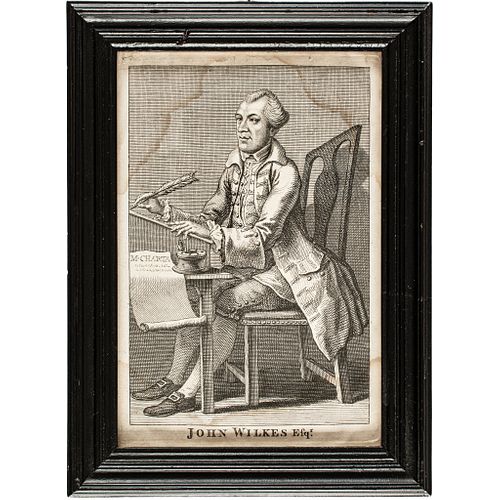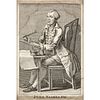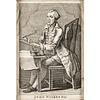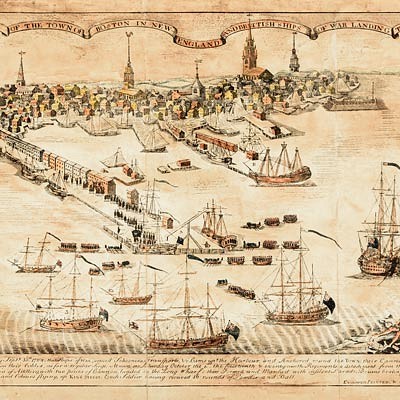c 1768 Engraving of John Wilkes Opponent of King George III, Champion of Liberty
Lot 182
Categories
Estimate:
$800 - $1,000
Absentee vs Live bid
Two ways to bid:
- Leave a max absentee bid and the platform will bid on your behalf up to your maximum bid during the live auction.
- Bid live during the auction and your bids will be submitted real-time to the auctioneer.
Bid Increments
| Price | Bid Increment |
|---|---|
| $0 | $10 |
| $200 | $20 |
| $300 | $25 |
| $500 | $50 |
| $1,000 | $100 |
| $2,000 | $200 |
| $3,000 | $250 |
| $5,000 | $500 |
| $10,000 | $1,000 |
| $20,000 | $2,000 |
| $30,000 | $2,500 |
| $50,000 | $5,000 |
| $100,000 | $10,000 |
| $200,000 | $20,000 |
| $300,000 | $25,000 |
| $500,000 | $50,000 |
About Auction
By Early American History Auctions
Mar 20, 2021
Set Reminder
2021-03-20 12:00:00
2021-03-20 12:00:00
America/New_York
Bidsquare
Bidsquare : Autographs-Colonial-Political-Americana
https://www.bidsquare.com/auctions/early-american-history-auctions/autographs-colonial-political-americana-6509
330 Lots of Rare, Historic Autographs, Americana, Civil War Era, George Washington, Abraham Lincoln, Slavery & Black History, Revolutionary War Era, Colonial America, Federal Period, War of 1812, Colonial Currency, Indian Peace Medals & more... Early American History Auctions auctions@earlyamerican.com
330 Lots of Rare, Historic Autographs, Americana, Civil War Era, George Washington, Abraham Lincoln, Slavery & Black History, Revolutionary War Era, Colonial America, Federal Period, War of 1812, Colonial Currency, Indian Peace Medals & more... Early American History Auctions auctions@earlyamerican.com
- Lot Description
American Revolution
c. 1768 Engraving of John Wilkes the Champion of Liberty
c. 1768 Colonial Pre Revolutionary War Era, Original Engraved Print titled, "John Wilkes, Esqr.", Framed, Very Fine.
c. 1768 Colonial Pre Revolutionary War Era, Original Engraved Print titled, "John Wilkes, Esqr.", no engraver or maker, Very Fine. This excellent sharply printed period Engraving measures 4.25" x 6.25" (by sight) having some modest humidity tone at the upper portions not affecting his image housed in a black-painted frame with metal loop for hanging on a wall at top, measuring fully 5.75" x 7.75". Wilkes is shown handsomely dressed, seated at his desk with a copy of "M[agna] Charta" lying beside his ink-pot while writing with his quill pen. Engraved c. 1768 this Print of John Wilkes the famed opponent of King George III and a major personality providing inspiration for the American Patriot "Sons of Liberty" as evidence by his name having inclusion on Revere's historic "Liberty Bowl". Wilkes was expelled from the British House of Commons for his views, imprisoned, and, in 1774 became Lord Mayor of the City of London, then elected to Parliament by having a popular image as the champion of Liberty.
John Wilkes (1727-1797) was born at Clerkenwell, the son of a distiller.
Wilkes was elected Member of Parliament for Aylesbury in 1757 but was a profligate adventurer and one of the notorious 'Monks of Medmenham'. The refusal of Lord Bute to appoint him Governor of Quebec or Ambassador to the Sublime Port prompted Wilkes to attack the administration in his weekly journal, North Briton. Then, after fighting a duel with Lord Talbot, he roundly condemned the illiberal programme set out in the King's Speech in No.45 of the paper.
The Secretary of State, Lord Halifax, ordered his immediate arrest on a common warrant but, when he was brought before Lord Pratt, then Chief Justice of Common Pleas, his detention was declared illegal and he was set free amongst general rejoicing. Earlier, Wilkes had composed a parody of Pope's Essay on Man, entitled Essay on Woman, that had been printed privately, doubtless for the Monks of Medmenham. This was read out in the House of Lords, deemed to be seditious libel, and a copy was burned by the Public Hangman.
Wilkes was expelled from the House of Commons and, fearing imprisonment for debt, fled to the Continent when he was dubbed an outlaw. In 1768 he returned to England where, after paying a fine of 1,000, he submitted to twenty-two months imprisonment. This proved to be a nominal sentence during which he was afforded every luxury and he actually contested the vacant parliamentary seat of Middlesex from the gaol. Three times he topped the poll and thrice his election was deemed to be invalid.
After his release he became first an alderman and, in 1774, Lord Mayor of the City of London. His election to Parliament the following year was accepted though he made little impact upon the legislature and, when he spoke against the Lord George Gordon riots, his popular image as the champion of liberty was somewhat tarnished. He retired to Bath where he died in 1797
Our Auction Contents:
Black History & Slavery: (Lots 1 - 63)
Abraham Lincoln Related: (Lots 64 - 74)
Historic Autographs: (Lots 75 - 235)
Colonial America: (Lots 236 - 261)
Revolutionary War: (Lots 262 - 304)
George Washington Related: (Lots 305 - 306)
Early American Guns & Weapons: (Lots 307 - 318) - Shipping Info
-
Early American provides in-house worldwide shipping. Please contact us directly if you have questions about your specific shipping requirements.
-
- Buyer's Premium



 EUR
EUR CAD
CAD AUD
AUD GBP
GBP MXN
MXN HKD
HKD CNY
CNY MYR
MYR SEK
SEK SGD
SGD CHF
CHF THB
THB













